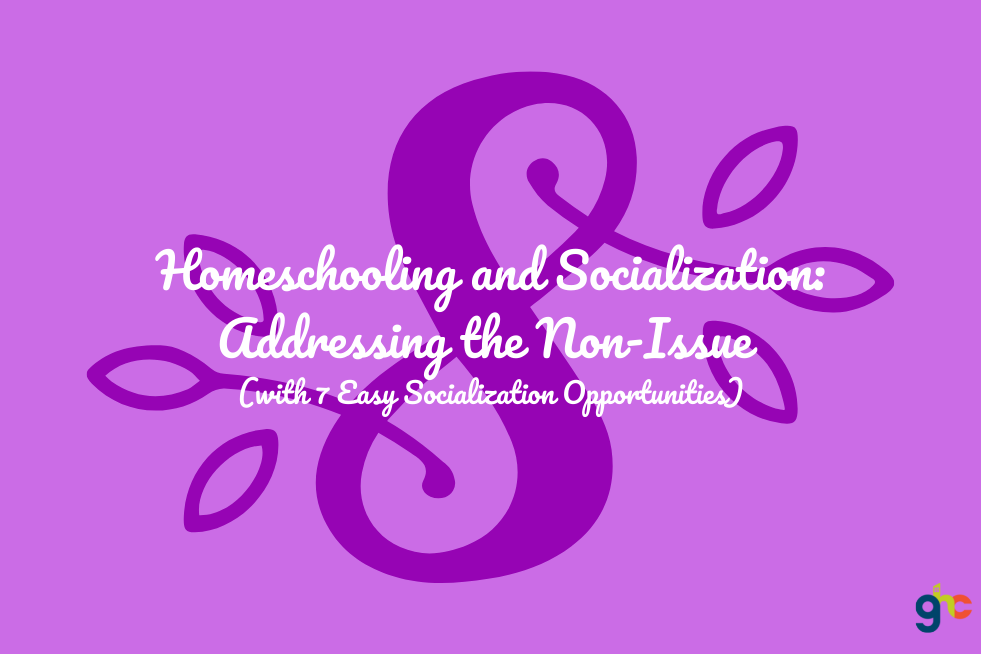You’ve packed snacks and drinks. You’ve stuffed necessities in well-worn travel totes. The kids are chattering in the back seat, and you’re going over mental checklists in your mind before the last buckle is clicked.
Why all the excitement?
Today’s schedule includes a homeschool outing.
You arrive at the park/museum/soccer game or any number of extracurricular venues. The kids pile out and you’re off on another educational adventure.

Halfway through the activity, you stop and smile. Your kids are engaged. Dialog occurs with many other people of all ages. Connections are being made. You’re feeling great about today’s event.
Then it happens.
Some well-meaning (or not) individual strolls over to your group and begins an all-too-familiar conversation that includes the dreaded question:
“What about socialization?”
The irony is not lost on you, since you’re actively socializing your children at that moment even if it isn't according "social norms". But let’s consider the ever-present query.
Homeschool socialization. What about it? What exactly is socialization?
Merriam-Webster presents the definition of the noun socialization as:
“the process by which a human being beginning at infancy acquires the habits, beliefs, and accumulated knowledge of society through education and training for adult status”
For comparison, their definition of the intransitive verb socializing is
“to participate actively in a social group” with the synonyms being: associate, fraternize, go out, hobnob, mingle, mix, step out
Likewise the American Psychological Association defines socialization as:
"the process by which individuals acquire social skills, beliefs, values, and behaviors necessary to function effectively in society or in a particular group."
Consider the difference between these two words. It’s clear that the inquiring public isn’t all that concerned that you’re teaching appropriate societal knowledge to your children.
They simply want to know, “What are you doing to make sure your kids have friends and aren’t isolated, social misfits?”
That may be a bit harsh, but that is the underlying sentiment. And why is this such an important question in the minds of the interested non-homeschoolers?
Why does the general public worry so much about the socialization process of homeschoolers?
Since modern homeschooling began in the 1970s, only a small fraction of school-age students have enjoyed its freedoms. That leaves a vast majority of people who passed through school systems with their standardized socialization, both before and after homeschooling became a thing.
The well-meaning (or not) the general public is only aware of how they spent their childhood years in school. They’ve connected traditional education with the typical process of socialization.
Institutional socialization is very different from homeschool socialization, and that tends to make people curious, and occasionally hostile. They don't understand that homeschoolers can have a social life even though they may so school at home.
What Is Socialization In Homeschooling?
All socialization begins at home. From the moment a child is born, takes their first steps, utters their first words, parents are engaging, instructing, correcting, and introducing their offspring to the values of their community and culture. This process of socialization starts at home and is a lifelong process.
This form of family socialization is maintained throughout the homeschool experience. Homeschoolers learn acceptable social behavior, interaction and cooperation skills, and problem-solving tactics both in the home and through outside activities with peer groups.
In a school setting, primary socialization occurs in a standardized manner. Young children learn to wait in line, ask permission to speak or move about, and follow directions as given, with very few personal freedoms within that framework.
This is more conditioning than actual learning; more like being assimilated into the system than becoming culturally aware.
Homeschool socialization is not standard.
Homeschool offers individualized socialization customized to the child’s needs, abilities, and demeanor. Each child is tasked with picking up social cues at their own pace, continually guided by their parents as the situation demands. This real-time feedback helps the child to learn social knowledge and process its meaning.
Instead of being tucked away from the community, homeschoolers are more often in the middle of community happenings, growing, thriving, and gaining moral development.
As for plain old socializing, homeschoolers have that covered, too.
How Do Homeschoolers Make Friends and Socialize?
Homeschoolers today spend a considerable amount of time on the go. From field trips to skills classes to co-op events, homeschoolers have a wide variety of activities available outside the home classroom. The question should be “How could you stop homeschoolers from making friends?” Answer? You can’t!
Another question in the mind of those who do not homeschool is “Won’t your kids turn out weird?”
Again, they’re drawing on their own experiences of social context spending almost two decades sharing common space with other students of their own ages. This age segregation is not likely to continue once graduates join the adult society and enter the workforce.
As home educators, we can be confident that any “weirdness” our kids display won’t be because we homeschooled them. Chances are, they were already different, just like their parents. After all, we chose to homeschool them, right?
Multi-dimensional homeschool socialization
Another area where homeschoolers shine is giving their kids a wide range of opportunities for positive socialization.
Whether they are in a co-op setting, volunteering at a charity event, visiting a historical learning site, or participating in a sport or artistic skills class, homeschool kids have the opportunity to interact with people of all ages and backgrounds.
- Exposure to so many different people over many different events is an excellent way for kids to learn cultural norms from many different angles.
- Real-time parental oversight is a fundamental part of the homeschool setting. The child can learn, experiment, and be instructed as a social interaction occurs, all in a safe environment.
- Homeschool socialization presents real-world learning opportunities instead of standardized imaginative interactions.
- Efficient use of homeschool hours leaves time for students to interact with their social surroundings without the constraints of tight schedules.
- If anything, homeschoolers have a head start on their institutionally educated peers since they associate often with such radically mixed groups of people.
Homeschool is an ideal social training ground for young people. Child development is important for all people homeschooled or not. Homeschooling is a great way to nurture that need.
Can we debunk socialization myths once and for all?
Research clearly demonstrates that most ideas about homeschooling and socialization are myths.
Myth: Homeschooled children are isolated.
Truth: Homeschool children have many more opportunities than their school peers to interact with the world outside their classrooms from kindergarten to high school and beyond.
Far from being isolated, home educators spend a great deal of time ensuring their children are part of the larger community. Homeschoolers are able to enjoy real-world activities while their peers are in a classroom.
“Kids who are in school just visit life sometimes, and then they have to stop to do homework or go to sleep early or get to school on time. They are constantly reminded they are ‘preparing for real-life,’ while being isolated from it.” - Sandra Dodd, author and unschooling advocate
Myth: Homeschooled children are unable to interact appropriately with others.
Truth: Since homeschoolers understand the importance of socialization and have the opportunity to interact with many different people of varying ages and backgrounds, they are well-equipped to handle personal exchanges, perhaps more than students who have spent their lives segregated with children their own ages.
“A recent study shows that in terms of self-concept, self-esteem and the ability to get along in groups, homeschoolers do just as well as their public school peers,” –Brian Ray, NHERI (National Home Education Research Institute)
Myth: Children need to be placed in situations where they can experience bullying so they can learn to defend themselves.
Truth: Unfortunatley, this is a common thought with the mass media. What an abject horror to assume children can only grow by being terrorized by their peers. Fortunately, homeschoolers are able to grow in a safe environment with watchful, caring adults and can avoid such undesirable situations.
“Children that live in a peer-dominant culture tend to be at greater risk for negative peer influences, such as rejection and deviance training.” Michael Brady, NHERI
Myth: Parents aren’t prepared to socialize their children the way teachers are.
Truth: On the contrary, parents have been socializing with their children from day one. They are the most appropriate providers for ongoing socialization since they not only know their children but want the very best for them. All human development begins at home, homeschooled or not.
“Research affirms that although homeschooling parents are not worried about their children’s social development, they do care about it. In fact, they are strongly committed to providing positive socialization experiences for their children.” --Richard G Medlin, Ph.D.,2006
Myth: Homeschoolers won’t fit in at college if they don’t go to school.
Truth: Aside from routinely scoring higher on college entrance exams, homeschoolers prove themselves much more capable of fitting in when they arrive at college. Professors are open with their praise of the homeschooled students in their classes.
“Homeschooled students are less likely to expect things to be given to them for little effort. They also tend to be more respectful, mature, and open-minded.”
“In my experience, homeschooled students are hard-working, polite, engaged students. They are not afraid to ask questions and engage with the instructor.”
--Responses from college professors on an informal survey. 2017. Midlife Blogger
The general takeaway from available research and discussion shows that home educators go out of their way to give their children plenty of positive social interaction. The results indicate that these children are better prepared to interact with the world than their peers from institutional schools, both during childhood and beyond.
These social proofs and others are more than enough to answer the questions and dispel the myths of the naysayers and those concerned that homeschool parents aren’t doing enough to ensure the “proper” socialization of their children.
“The idea that children need to be around many other youngsters in order to be ‘socialized’ is perhaps the most dangerous and extravagant myth in education and child-rearing today.” –Dr. Raymond Moore
Why Parents Should Be In Charge of Socialization
Placing a child in a social situation doesn’t mean that situation is appropriate, safe, or even helpful. Turning a child over to an institution will not guarantee positive social development, and may even cause harm.
The ultimate responsibility for socialization falls on parents inside and outside the home. By choosing to educate their children both academically and socially in a homeschool setting, these parents can integrate the best personal teaching and training possible and provide a safe learning environment for their children. Parents have the well-being of their children in mind and want the best for them. They can choose the best path of socialization for their kids.
Where should homeschoolers look for socialization opportunities?
Opportunities abound for homeschooling families to participate in their communities. Here are some ideas you can easily incorporate into your schedule right away.
1. Local Homeschool Co-ops or Groups
A homeschool co-op is a group of local homeschoolers who have joined together to give their children a place to interact with other homeschool families. Co-ops may offer classes taught by the parent-members, organized field trips, educational activities, and support. Sometimes the groups get together on a regular basis at a local park for some freestyle playtime.
Check out your local homeschool groups to find a co-op that fits with your children and your parenting style.
Benefits of homeschool co-ops
- Meeting local homeschool families
- Exploring common subjects through cooperative learning sessions
- Children can be around peer groups and interact with children of the same age
- Creating memories with friends through educational trips and recreational activities
2. Sports Teams and Athletic Activities
See if your state or local recreation departments open their sports programs to homeschoolers. If this is available in your area, you can take advantage of organized sports teams and scheduled events.
Alternatively, you can form a team of local homeschoolers. A shortlist includes football, baseball, gymnastics, archery, soccer, martial arts, and basketball.
Benefits of participating in athletic activities
- Learning to work cooperatively to reach a common team goal
- Increased fitness and agility
- Confidence through accomplishment and mastery of athletic skills
Recreational activities
There are many opportunities for your child to pursue a passion or hobby. Search for groups in your area formed around a mutual activity, such as ham radio, dancing, cooking, sewing, rocketry, woodworking, or learning to play a musical instrument.
These groups include people from diverse backgrounds all offering support and encouragement.
Benefits of joining a recreational group
- Learning a new skill or developing a current skill.
- Sharing ideas and suggestions with people of varying levels of experience.
- Hands-on experience in a particular school subject, such as history or science
3. Music and Theater
More involved activities include joining an orchestra, local band, or acting troupe. Even if your child doesn’t play an instrument or act, there is always a need for people to handle equipment or backdrops.
Look for opportunities to audition for parts or places in local musical or theatrical groups.
Benefits of music and theater
- Building confidence by performing in front of an audience
- Learning collaboration skills and how to offer suggestions in a group setting
- Gaining a sense of belonging by participating in a performance meant to benefit the entire group
Academic Groups
For those homeschoolers who prefer quieter activities, there are groups suited to intellectual pursuits. Reading clubs, speaking clubs, gaming teams, and foreign language groups offer opportunities for debate and interaction among members.
If you can’t find a club suited to your student, you can create one. Start a book club, a debate team, a chess club, or a French or Spanish club right in your area.
Benefits of academic groups
- A deeper study of a particular interest
- Sharing common interests with other members of the group
- Learning skills from more experienced members
4. Religious Groups
Communities offer youth group activities through churches and other religious establishments. These groups often admit homeschoolers regardless of their religious affiliation.
You can find hosted camps, events, and opportunities for fellowship among people of varying ages and interests.
Benefits of religious activities
- Learning more about religion if you’re not currently involved
- Discovering cultural and historical differences between religious groups
- Interacting with a wide range of ages and backgrounds
5. Volunteer Groups
Organizations that offer volunteer opportunities fit well with homeschoolers. Red Cross, Salvation Army, local scouting groups, and local police and fire departments sponsor numerous events where people from all walks of life join together to share their time and energy to aid the less fortunate.
Benefits of volunteering
- Seeing first-hand how offering up assistance can positively affect people or even animals at risk.
- Becoming aware of diverse socioeconomic conditions.
- Feeling a sense of community benevolence through helping

In Closing … So, What About Socialization?
“What about socialization?” is a question that should be put to bed. After nearly half a century of social proof, it’s about time homeschoolers get the benefit of the doubt that they are doing an excellent job training their children to be upstanding members of society.
The so-called “S” word in homeschooling should be rebranded as a non-issue. Those concerned about how homeschoolers will turn out should instead turn their attention to improving institutional schools.
Homeschooling parents concerned about how their children will turn out should follow the homeschool pioneers and researchers to learn that what they’re doing is exactly what their children need.
Resources:
Homeschooled Children’s Social Skills, Richard G Medlin, Ph.D., 2006
Homeschool Researcher, Volume 15, Number 4, NHERI, 2003
